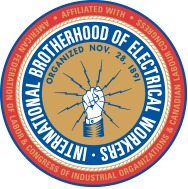The Canadian Women’s Conference in Toronto last November was a celebration of firsts, starting with being IBEW Canada’s first major in-person event since before the pandemic.
“It was pretty cool, everyone was so excited to see each other,” said Cheryl Paron, the First District’s international representative for diversity, equity, and inclusion. “I had a hard time reining them in to start the conference. It was like the first day of school trying to get everyone to settle down.”
Once she did, the 85 delegates heard from speakers who included Bea Bruske, the first woman in 30 years to lead the Canadian Labour Congress; Liz Shuler, “a proud IBEW sister” and the first woman to lead the AFL-CIO; and Fourth District International Vice President Gina Cooper, the IBEW’s first woman IVP.
“This role for me is a win for all of us,” Cooper said. “Every time one of us breaks that glass ceiling it makes it easier for the next.”
Delegates came from across the nation’s six time zones, following all COVID-19 safety protocols to renew their bonds and recharge their spirits over three days.
“If you look at the size of the IBEW in Canada, we are kind of remote from one another,” said Becky Lupton of Vancouver, British Columbia, Local 213. “Getting together to hear their experiences, their stories and their triumphs — not just struggles, but their triumphs, the things they’re succeeding at — is really important. It helps push you forward.”
Supportive union brothers are essential, too, and delegates and speakers alike expressed gratitude to one of their strongest allies — First District International Vice President Tom Reid.
“Thank you, Tom, for your focus, your resilience, and to your entire team for recognizing the power that our women in the movement have,” Shuler told him.
CLC President Bruske praised IBEW Canada for living its values. “You have long worked with the government to invest in women and to help reduce barriers to participation and advancement,” she said. “You are a shining example of activism, engagement, and leadership.”
In his own remarks, Reid honored the work of IBEW staff women and revisited the 2019 conference’s theme of women in leadership.
“Run for election, volunteer for a committee, take a steward appointment if offered. This is how we will make needed change,” he said. “I believe women belong in all levels of leadership in the IBEW and the labour movement, and I want to encourage you to do just that.”
Paron said delegates included about a dozen men, mostly business managers, who took part in an eye-opening new program from the Canadian Women’s Committee.
“We put them through an allyship bootcamp,” she said: “Four workshops with real-world examples.”
Some of the men had attended past women’s conferences, others were newcomers. All appeared shaken by what they heard.
“When men hear anecdotally about women being harassed and discriminated against on the job, sometimes they’ll say, ‘Is that actually still happening?'” Paron said.
“I think having these women right in front of them, putting a face to the story, hearing these painful experiences, makes it more real. When you have a woman full of emotion telling you what she’s been through, you can’t unsee or unhear that.”
Women also cited progress at work and times when union brothers had their backs. But Reid said present-day stories make it clear there’s a long way to go.
“We still have a toxic environment on a lot of jobsites and our women face that every day,” he said. “They need support on the jobsite and off the jobsite to change that culture.”
Change can be expedited with more women in charge, speakers stressed.
“I’ve reached this place in leadership [by] working with and standing on the shoulders of the women in our movement,” said Shuler, whose union career began at Portland, Ore., Local 125.
She urged her audience to do the same.
“If you’re hesitating because you’re saying, ‘I don’t think I’m qualified,’ think again,” Shuler said. “Because while you’re talking yourself out of it, there’s a guy right next to you who is less qualified saying ‘Heck yeah.’
“Take that next step. The labour movement needs you.”



